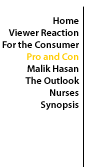 |
 |



Our health care system is failing. It is expensive, bureaucratic, and denies
care to many in need. Americans die younger, get less care, face greater
restrictions, are less satisfied, and spend at least
$1,500 more per person on health care than Canadians or Western Europeans -
nations that have opted for non-profit national health insurance.
In the U.S., canons of commerce are displacing dictates of healing,
trampling medicine's most sacred values. Market medicine treats patients as
profit centers. The time doctors and nurses are allowed to spend with the sick
shrinks under the pressure to increase throughput, as though we were dealing
with industrial commodities rather than afflicted human beings in need of compassion
and caring. Listening, learning, and caring give way to deal-making, managing,
and marketing. The primacy of the patient
yields to a perverse accountability - to investors, to bureaucrats, to insurers
and to employers. And patients worry that their doctor's judgement and advice
are guided by the corporate bottom line.
Policy wonks hail profit-driven care as the panacea for medicine's
ills, the route to efficiency, accountability and compassion. Milton Friedman,
the guru of free market economics, had no such illusions, admonishing corporate officials to shun any "social responsibility
other than to make as much money for their shareholders as possible." Indeed,
shareholders can sue any corporate executive who voluntarily sacrifices profits
to patients' interests. |  |
| 
Unfortunately, good medicine requires a panoply of unprofitable, even
anti-profitable actions. Prevention, cure and care are rarely the cheapest
course. HMOs advertise free health-club memberships and a handful of
preventive services to woo healthy, profitable customers. But few HMOs trumpet
superb stroke rehabilitation or diabetes care; attracting the expensively ill
is commercial suicide. Not surprisingly, research shows high satisfaction and
good outcomes for healthy HMO members. But even the best HMOs undertreat the sick. HMO stroke patients get less rehabilitation
and more often end up in nursing homes. Medicare HMO patients are denied
needed home care. Depressed patients in HMOs are less likely to be diagnosed,
get less treatment, and are more frequently disabled by their illness. Poor,
sick patients have a 21% higher risk of dying in HMOs than in fee-for-service
care.
HMOs prod doctors and nurses with threats and bribes to abdicate
allegiance to patients, and to shun the sickest, who may be unprofitable.
Physicians risk being fired or "delisted" for giving, or even discussing
expensive services, and many are offered bonuses for minimizing care. A
university hospital chief admonished faculty doctors "[We can] no longer
tolerate patients with complex and expensive-to- treat conditions being
encouraged to transfer to our group."
| 
|
| At the same time, the ranks of the uninsured continue to grow, while
safety-net public hospitals and clinics shrink, and public health programs
erode. Even many with insurance find coverage deficient when they need it most; care or payment are too often denied for emergencies or
expensive illnesses. The sick are denied skilled nursing care, rushed out of
hospital beds and hurried through office visits. Increasingly, patient
comfort, the special needs of the elderly, infirm, or disabled are ignored if
they conflict with the calculus of profit.
Public resources of enormous worth - non-profit hospitals, Blue Cross
plans, visiting nurse agencies, even hospices - built over decades by taxes,
charity and devoted volunteers, are being taken over by companies responsive to Wall Street and indifferent to Main Street.
Communities find vital services closed by remote executives; savings are
committed not to more pressing health needs, but to shareholders' profits. Not-for-profit institutions, forced to compete, must
also curtail unprofitable activities like research, teaching and charity, or
face bankruptcy. Hospital chains' profits reach $100 per patient per day; a single HMO president nets $990 million in a take-over deal;
and insurers' overhead consumes $46 billion annually.
Nor is profit-driven care more efficient. Even as the ranks of the un-
and under-insured expand, U.S. health care costs are higher and continue to
grow faster than in nations with non-profit national health insurance. Profits, and the bureaucracy erected to secure
profitability, consume an ever-larger share of health care dollars. For-profit
hospitals are costlier, largely because of their lavish spending on bureaucrats
who devise ways to raise profits, e.g. by billing scams, excluding the
uninsured, paying kickbacks to physicians who refer profitable patients, or
even kidnapping insured patients in order to fill beds. Meanwhile, HMOs have
actually increased Medicare costs by $2 billion annually by selectively recruiting healthy seniors whose care would have cost little in traditional
Medicare.
We criticize market medicine not to obscure or excuse the failings of
the old fee-for-service system, but to warn that the changes afoot push
medicine further from caring, fairness and efficiency. The headlong rush to
profit-driven care is occurring without the assent of patients or
practitioners, through a process largely hidden from public scrutiny and above
citizen participation. This must be replaced by an open and inclusive process
that is not dominated by the loudest voices - those amplified by money and
political influence. We believe that, if given full and objective information,
the American people would opt for non-profit national health insurance as have
citizens of most other developed nations.
Our civilization holds that some aspects of life should be off-limits
to the market. Government, the police and fire departments, and the military
should not be for sale; nor should profits be made selling sexual intimacy, or
children for adoption. Our constitution recognizes a compelling public
interest in religious free speech, and in unfettered discourse on public
policy. Here, commercial interests have no standing. They should have none in
medicine.
[For further information about the fight to oppose profit-driven care visit
Physicians for a National Health Program and The Ad Hoc
Committee to Defend Health Care]
|  |
 |
home .
viewer reaction .
for the health consumer .
pro and con from the experts .
malik hasan: a profile
the outlook for managed care .
what's happening to nurses? .
synopsis .
press reaction .
tapes & transcripts
pbs online .
FRONTLINE online .
wgbh
New Content Copyright ©1998 PBS and WGBH/FRONTLINE
Some Images Copyright ©1998 Photodisc
|